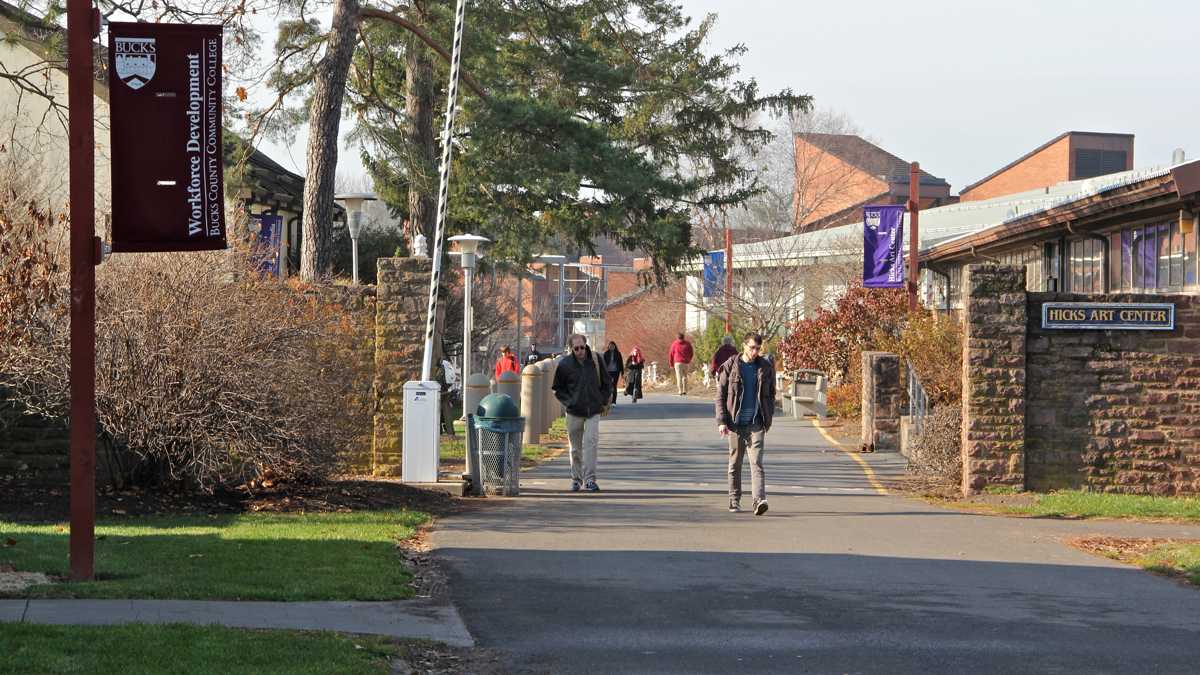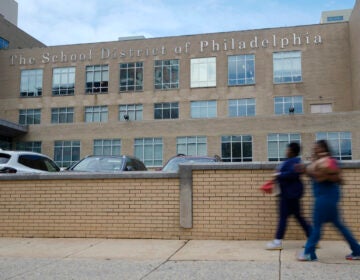Community colleges, Pa. state universities approve ‘reverse transfers’

Bucks County Community College
Every year, more than 3,000 community college students transfer to one of the 14 universities that make up Pennsylvania’s State System of Higher Education.
Students who took a break before earning an associate’s degree will now have the opportunity to finish their degree without returning to community college.
Pennsylvania’s 14 community colleges and its state-owned universities have signed a “reverse transfer” agreement allowing eligible students to combine credits from both schools to earn an associate’s degree.
The program aims to help students who were close to completing their associate’s degree, but had to step out — particularly adult learners and service members, said Kenn Marshall, spokesman for the state system.
The credits students earn at state system universities will transfer back to the community college where the student started, Marshall said.
“It’s a convenient way for students to basically get the degree that they’ve already earned,” he said. “They already have the credits, but because they’ve earned them in two different institutions without some kind of process in place, it’s difficult for them to get that degree.”
Brett Rettew, a junior at Millersville University, has been in school for six years. The Lancaster County native started at Harrisburg Area Community College, but as a reservist with the U.S. Army, his studies were interrupted by multiple military deployments.
Although Rettew already received his associate’s degree before transferring to Millersville, he sees how this program can benefit others who, like him, have had to pause their studies.
“It’s nice to be able to transfer back and forth knowing you’re going to get credit for a degree,” he said. “It’s a good viewpoint from us veterans. A lot of military guys are jumping around schools, and this is a good opportunity to enlighten them about what’s out there.”
Several state system schools, including Millersville, already had individual agreements with nearby community colleges, but the partnership that takes effect this summer expands it statewide.
Danielle Gross, director of public affairs for the Pennsylvania Commission for Community Colleges, said 65 percent of their students are part time, have a median age of 23 and many need to step out.
“The reverse transfer program will allow students, if they transfer to a state system university and their education gets interrupted for any reason, they can step out of their higher education not with just some college, they can actually have a degree under their belt,” she said.
Nearly half of last year’s undergraduate transfers to state system universities were from one of Pennsylvania’s community colleges.
The benefits of the degree go beyond the obvious things, like increased earning potential and career advancement, Gross said.
“A study by the Lumina Foundation found that people who have at least an associate’s degree are more likely to vote, to volunteer, their children are more likely to go on to higher education,” she said. “So really, these benefits really last a lifetime.”
Higher education isn’t just important for students or learning institutions. Marshall, the state system spokesman, said the Georgetown University Center on Education and the Workforce determined nearly 60 percent of jobs in Pennsylvania will require some higher education by 2020.
“This is an easy way for those who don’t have that first degree, without having to spend more money. They’ve already earned it,” he said.
The initiative will also help Pennsylvania Gov. Tom Wolf reach his ambitious goal of helping more people finish college. Wolf wants to nearly double the percentage of Pennsylvanians with a college diploma — currently 36 percent — to 60 percent by 2025.
“Anything that we can do to encourage more individuals to receive that degree, the better it’s going to benefit, not only that individual, but the state as a whole,” Marshall said. “The better educated the general populace is, the better off the state’s economy is, the better off everyone is.”
State-owned universities will identify eligible students with a total of 60 credits, including a minimum of 45 community college credits, who have attended community college within the past five years.
The first degrees could be awarded as early as this summer.
WHYY is your source for fact-based, in-depth journalism and information. As a nonprofit organization, we rely on financial support from readers like you. Please give today.




